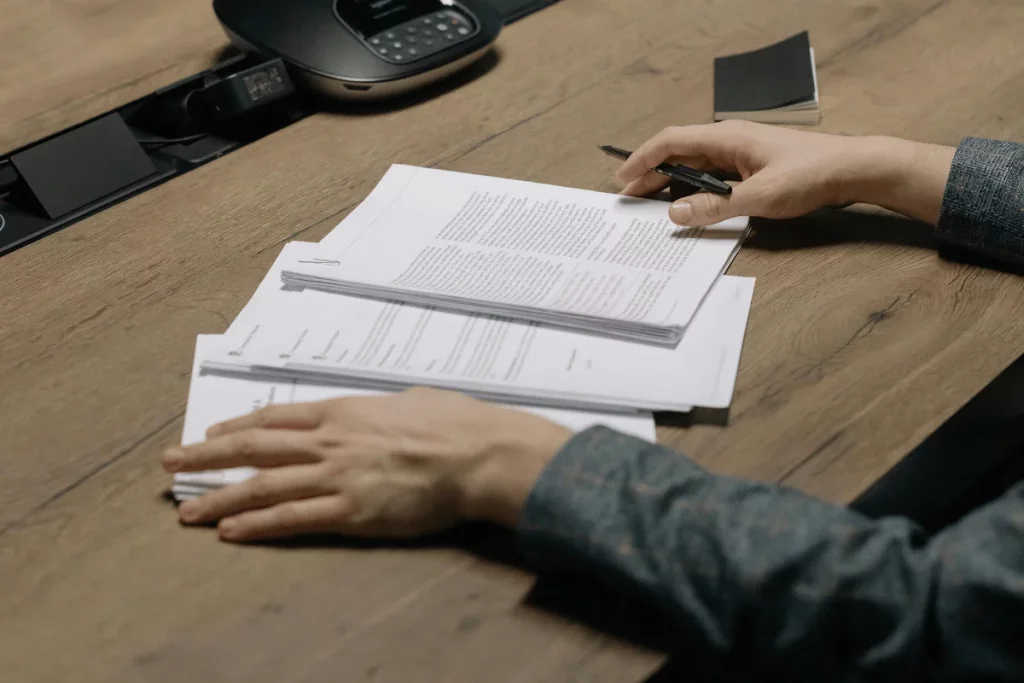The merger agreement is one of the most critical legal documents when companies merge. This guide shares the key elements to consider in the agreement and tips to help you evaluate a merger successfully.
During the evaluation, it's advisable to work with M&A experts who can help you understand the provisions of the business combination agreement.
At Exitwise, we can help you recruit and manage a team of industry-specific M&A experts who can help you actualize your business exit. Speak with our team today about your potential exit.
Ever wondered how much your company is worth? Use our valuation calculator to see just that.
A merger agreement is a legal document that typically outlines the terms and conditions under which two or more companies or businesses combine to form one new entity.
You may also refer to a merger agreement as an ‘agreement of merger.’
The merging parties usually sign the document after negotiations, agreeing to sell their stocks and assets and even transfer their liabilities to the newly formed entity at an agreed price.
The agreement usually outlines how each company's assets and stocks will be divided and liabilities assumed, including what may happen if the deal falls through.

Here are some key benefits of a merger agreement:
Each party is usually well aware of their responsibilities, rights, and liabilities regarding the merger. The agreement may also help you manage your expectations, which can further help minimize disputes.
Poor process management may be entwined with poor due diligence, a critical M&A risk that may cause the merger to fail.
For example, you may be able to regulate the time and money that you put into the extensive merger negotiations.
The other party or parties may further acknowledge your professionalism, seriousness, and commitment to the merger, which may help improve the overall chances of the combination succeeding.

Different merger agreements have different provisions, depending on the deal and the preferences of the parties involved.
Here are the typical elements you may find in a standard M&A contract for a merger:
The description of the merger typically includes details such as the parties involved, the merging entities, the effects of the merger, and the conversion and valuation of shares.
The description often includes the date and time the merger takes effect, as well as the certificate of incorporation and bylaws.
The agreement usually explains how shares will be paid, such as an agreed cash amount for each share.
You may also agree that dissenting shareholders should receive a fair-value cash payment for their shares.
Representations and warranties are typically added to a merger agreement to protect you and the other party or parties from potential liabilities.
This component is usually presented as statements each party makes to testify that the information they have provided is accurate, such that any misrepresentation can prompt the affected party to terminate the agreement or sue for damages.
Merger covenants are typically pre-closing and post-closing promises that you and the other parties make to each other to assure them of your responsibilities and commitments.
Merger agreements usually include conditions for the consummation of the merger. They are the critical points or issues you and the involved parties may have to address before completing the deal.
For example, you may be required to obtain and comply with all the necessary regulatory approvals.

Business merger agreements typically include a termination clause that gives you and the other parties the power to end the deal in certain situations without any legal trouble.
For example, you may want to terminate the deal if the other parties breach the contract or the time for consummating the deal expires before the agreement takes effect.
The merger agreement usually includes the agreed price for the purchased assets or stocks. You may also add the forms of payment, such as cash, earnouts, or promissory notes.
The agreement may also include other matters related to the purchase price, such as price allocation and taxation aspects.
Either party may suffer because of misrepresentations and breaches of covenants and warranties that materialize or become known after the merger closes.
You may want to add an indemnification clause to protect and compensate them for any damages.
In some merger agreements, you may find a confidentiality clause that usually prohibits the involved parties from revealing details of either company or the merger.
The prohibition period can be until you sign the deal, 1-5 years after signing, or indefinite.
The post-closing activities section usually outlines the integration plan and expectations so you may understand the process and what lies ahead.
Tip: Drafting and negotiating a favorable merger agreement can be challenging. You may need the help of M&A attorneys, tax accountants, wealth advisors, investment bankers, and business appraisers.
We at Exitwise can help you hire the best M&A experts who can help you draft, negotiate, and execute an effective agreement for your merger. Book a consultation with us today to get started.

When it comes to complex legal documents such as merger agreements, you may make costly mistakes that might sink the deal.
Here are some common mistakes to avoid to increase the chances of a successful merger:
You and the other merging entity or entities usually allocate management responsibilities for a certain transition and post-merger period.
Allocating these responsibilities poorly may lead to disputes that could ruin the success rate of the merger.
Ideally, it's advisable to have a key point person charged with overseeing the merger. You may want them to focus on the three critical post-integration aspects of communication, culture, and people.
Your merger agreement may not accurately estimate the integration period and the costs associated with transition and post-integration activities.
Prolonging the period can drain you and the other parties emotionally, physically, and psychologically. Additionally, the costs may run over and strain you financially. These stresses may place the merger at risk of failure.
Conducting due diligence poorly or insufficiently may lead to an ineffective merger agreement.
For example, suppose you do not research and understand the other business you are merging with.
In that case, you may enter into an agreement that may leave you exposed to fraudulent information or misrepresented facts. Seeking legal redress in such situations may be costly and time-consuming.

As mentioned, negotiating a favorable business merger deal and merger agreement can be challenging. The good news is that you may not have to do it alone.
M&A experts can help you negotiate the merger and its agreement. Business lawyers can help you understand the legal aspects of the agreement, while accounting experts can help you understand the tax implications of the deal.
At Exitwise, we leverage our experience and global network of M&A experts to help you form the best team of professionals to create the optimal exit of your dreams.
We have interviewed and rated hundreds of specialized tax accountants, investment bankers, and M&A attorneys by their success rate, exit values, and average transaction size to help you hire and manage the right experts.
Consult with us today to leverage our experience in the M&A process, which can help you maximize your exit.

Let's close the discussion with commonly asked questions about agreements of merger:
Firstly, it's advisable to be involved in the valuation process from the start so you can agree on how to value the merging businesses properly.
Secondly, the experts we help you hire can help you review the valuation and determine whether it’s fair for your business. They can also negotiate a better valuation for you as deliberations continue regarding the merger agreement.
The Federal Trade Commission and the US Department of Justice are jointly tasked with evaluating mergers to ensure they don't violate antitrust laws.
If your merger doesn't receive regulatory approvals, you may negotiate with the regulatory bodies to reach a settlement or compromise that favors all stakeholders, including customers.
For example, you may opt to divest your business units or investments to preserve competition.
Reviewing the merger agreement is part of the overall M&A due diligence.
Due diligence can help ensure that all the provisions in the merger agreement are as you and the other merging company or companies agreed upon.
Renegotiating the terms of a merger agreement after you sign it depends on the parties involved and the modifications you need.
In most cases, all the parties usually agree to renegotiate to save the merger. You may even agree upfront in the agreement that you may renegotiate its contents if the need arises.
Now you know what a merger agreement is, how it works, and what to look out for in the document to evaluate the merger effectively and make informed decisions.
Since negotiating the agreement and dealing with the merger can be challenging, you may want to work with M&A experts throughout the process.
At Exitwise, we can help you find and manage the best M&A experts who specialize in your industry to help you exit your company or business successfully. Talk to our M&A advisory team today to kick off the process.
Let Exitwise introduce, hire and manage the best, industry specialized, investment bankers, M&A attorneys, tax accountants and other M&A advisors to help you maximize the sale of your business.

